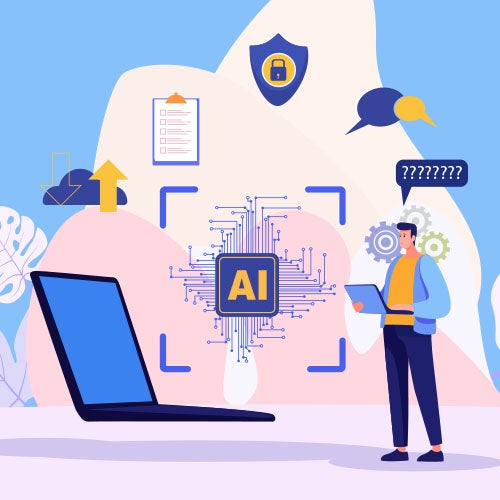Posted on 9/26/2018 in Digital Marketing
By wakefly
It’s widely known that marketing is becoming more and more technical. All you have to do is look at the number of software applications out there that promise to move marketing mountains on your behalf. As artificial intelligence grows in ability, it is no surprise that marketers are taking advantage of this every chance they get. However, it also isn’t very new for us. Programmatic advertising where vendors use algorithms to determine which ads are the best ads to display has been around for years. Recommendation engines have been around for years. Today’s search predicts what it thinks you are looking for.
When people discuss artificial intelligence, they are usually referring to one of the following:
- Machine Learning is when algorithms learn from historical data sets. Examples are OCR, Facial/Image Recognition, dynamic pricing, etc. This often doesn’t involve the prediction of behavior.
- Applied Propensity Models is when the data that has been learned above is applied to predict something in the future. There is a lot of marketing applications with this. For example: lead scoring, website personalization, predictive search, etc.
- Artificial Intelligence is when the machine is “thinking & learning” on its own. A true AI system doesn’t really exist yet. Google’s DeepMind is a learning neural network. Siri & Alexa are maybe the closest that we have to everyday AI. I don’t want this post to split hairs over what is or isn’t true AI. For the majority of you reading this, Siri or chatbots can represent what Artificial Intelligence is. Just know that an AI purist is going to laugh at you if you try to pass that off!
So what are some real-world applications of artificial intelligence that you can apply today in your online experience? Below are a few that I have found to have a lot of potential. While I am not giving them specific endorsements and have no financial ties to any of them, you will have to admit they are pretty cool.
Image Recognition
There are several ways that improvement in image recognition is going to impact digital marketing and web design.
The first is the concept of image search. This is where you snap a picture of something you want to buy, and the application finds it for sale on the web. Think about that for a second. There would be no language barriers from a content standpoint. How do you compete on that platform? How do you optimize for this scenario? One such vendor is CamFind.
The second concept is near and dear to me as someone who has worked in web design/development and digital marketing for close to 20 years. CloudSight is an application that will automatically create the schema markup for images on the fly. Images play such a large role in web design and SEO and most companies that come to us don’t have any alt tags or descriptions of their image. The amount of time that could be saved in using the API could save hours upon hours. Even if you don’t have a specific use for it, you have got to check it out. They have a free demo and it amazes me.
Virtual Agents & Chatbots
Chatbots are everywhere. Why shouldn’t they be? Users hate talking to salespeople (sorry salespeople) and would much rather talk to a nameless and faceless bot to get the info they need. As this technology improves, we are going to start to see more and more Virtual Agents. These are bots with an attitude. VA’s can “do” things for us such s the way Alexa can order things for us from Amazon.
The going theory is that Virtual Agents will become specialized - think travel agents, shopping agents, customer service agents, etc. Where it will start to get fun is when they start talking and working together. You tell Alexa “Book me a trip to Munich on October 1st” and Alexa reaches out to a travel virtual agent that will search the web for the best deals and provide options. That information is sent back to Alexa who checks your calendar and back and forth it goes.
As far as I know, we haven’t gotten to this point yet...but from a marketing perspective, how do we market ourselves to bots? SEO, schema, the conversational text will continue to be critical as we move into this reality.
Content Creation
Most people I know do not enjoy writing. There are topic sentences and predicates, nouns and verbs, and what is the darn difference between a colon and a semi-colon?!?! (In case you are wondering, check this out.). This is where some sophisticated content writing AI’s are available. They still have a way to go in that I don’t think they can write an entire body of content unassisted. You will still need to edit to account for your own personality and check grammar. However, it actually does a pretty decent job.
One such application is Articoolo. For a fairly nominal fee, you can get an article written on just about any subject. You enter 2-5 words about your topic, then add another couple of words about a sub-topic - and presto chango….you have an article. Now, I did NOT use this service for this current article. However, in the few tests that I ran on it, it produced a really good starting point on some other topics. It can certainly help if you are just stuck on how to start; which is really where most people struggle.
Artificial intelligence is growing at lightning speed. It draws the ire of some and the awe of others. As a marketer, I think about what does this really means for my clients? What can I do today to set them up for the future? In the end, I think the key is to never sit back and watch what is happening. You really need to just jump right in.
Want to integrate cutting edge technologies with your website and digital marketing?
Contact us today to find out how we can help!
Related Articles

How Do I Optimize My Website for AI?
Why do you need to optimize your website for AI?AI-powered search engines like Google’s AI Overview, Perplexity, and tools such as Microsoft's [...]

Outdated or Outstanding? How to Tell If Your Website Needs a Refresh
Your website is the digital face of your business. It serves as a first impression, a marketing tool, and a resource for potential customers. [...]

Preparing a Website Redesign Budget for 2025: A Step-by-Step Guide
As we approach 2025, businesses are recognizing the necessity of a fresh, user-friendly website to stay competitive in a rapidly evolving digital [...]

